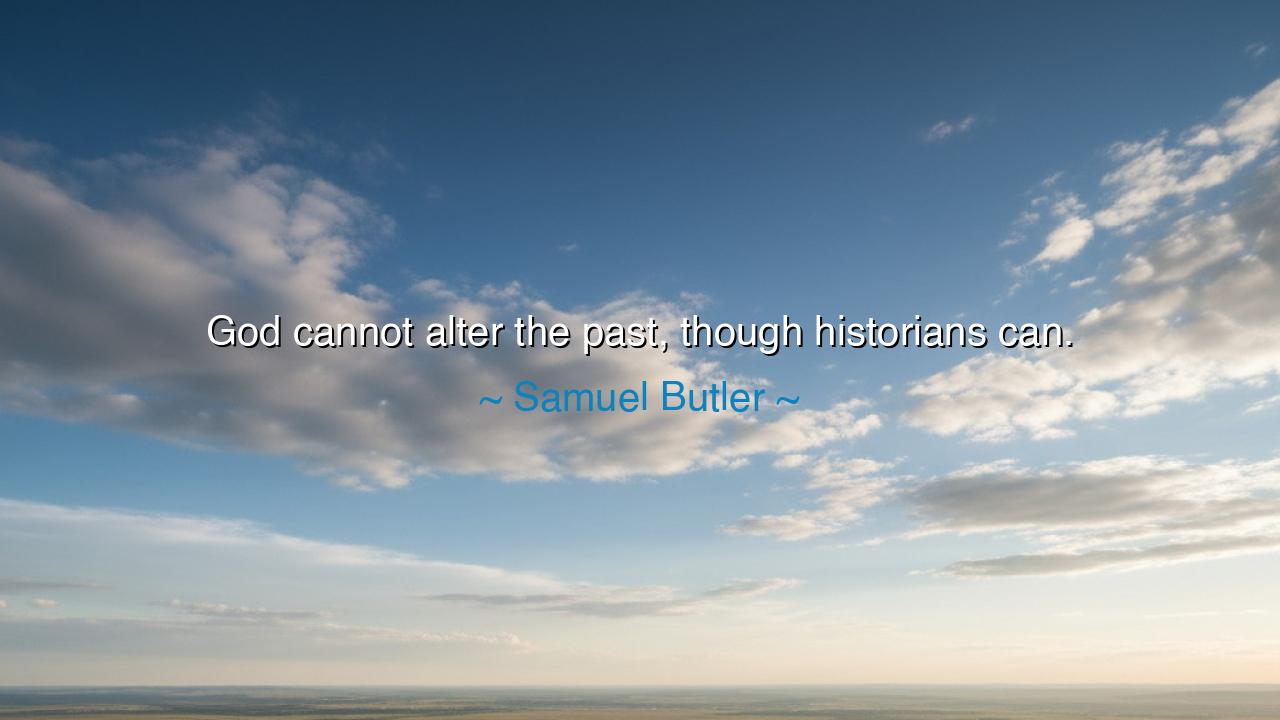
God cannot alter the past, though historians can.






“God cannot alter the past, though historians can.” — Samuel Butler
In this bold and piercing statement, Samuel Butler lifts the veil on one of humanity’s most unsettling powers — the power not merely to remember, but to reshape memory itself. When he declares that God cannot alter the past, though historians can, he does not mock the divine, but warns humankind of its own dangerous gift: the ability to bend truth. God, who is bound by truth and eternity, allows what has been to remain as it was. But humans, frail and ambitious, often reach backward into the river of time and muddy its waters, crafting tales that serve their pride, their nations, or their fears. Thus, Butler’s words echo through the ages as both revelation and rebuke — for no sword is sharper than the pen that rewrites history.
In the days of empires and kings, history was the province of the victors. When Caesar crossed the Rubicon and seized Rome, it was his own hand, or the hands of his loyal chroniclers, that told the story. His enemies were silenced, their truths buried beneath the triumphal arches of his glory. God, though He saw the blood and betrayal, did not change the record; He let humanity bear the burden of truth and deceit alike. But the historians, servants of power, shaped the tale into one of destiny, not ambition. Thus the world remembered Caesar as hero, not usurper — proof that while heaven preserves truth, men preserve myth.
And so, across the centuries, the past became a battlefield no less fierce than the present. When the pharaohs of Egypt carved their deeds upon the stone, they erased the names of those they despised, chiseling them from memory as though they had never lived. In the Soviet era, entire faces disappeared from photographs, comrades vanished not only from life but from record. The past, sacred and unchangeable in the eyes of God, was remade by mortal hands. The consequence was not only lies upon parchment, but confusion within the soul of a people — for a nation that forgets its truth forgets itself.
Yet Butler’s words are not only accusation — they are a mirror. For every one of us, in our small lives, becomes a historian of the self. How often do we retell our own stories, softening our failures, excusing our wrongs, remembering what flatters us and forgetting what wounds us? We, too, alter the past in our hearts. We call it coping, or learning, or healing — and sometimes it is. But beware, for when we alter too much, we lose the sacredness of truth. To face the unaltered past — to accept it as it was, with all its darkness and pain — is to walk in the footsteps of the divine. For truth, not comfort, is the path to wisdom.
Consider the story of Galileo Galilei, who was condemned for declaring that the Earth moves around the Sun. The Church, powerful in its age, sought to rewrite reality itself. For centuries, history recorded Galileo as a heretic, while his judges stood as defenders of faith. But time, relentless as the tide, restored the truth — and those who once wielded history’s pen were unmasked as fearful men. Thus the cycle turns: history, altered by human will, is eventually reclaimed by truth. It may take generations, but truth is patient where we are not. God cannot alter the past, for He has no need to; it is we who must reconcile ourselves to it.
From Butler’s wisdom, we learn this: guard the past as sacred ground. Do not alter it to please your pride, nor to ease your shame. To know your true story — whether personal or collective — is to be free. Let the record of your life stand honest and unvarnished, and it will teach you more than a thousand fables ever could. Likewise, seek the truth in the histories of your people. Question what you are told; listen for the voices of those forgotten or silenced. Truth is not found in the polished halls of the victors, but in the dust where the fallen lie.
The lesson is this: the past is a temple, and every fact within it is a stone of its foundation. Alter one, and the structure trembles. Honor it, and wisdom endures. Be wary of those who paint yesterday to suit today, for they wage war not on others, but on truth itself. And when you tell your own story — in word, in act, in legacy — tell it as it was, not as you wish it had been. For though historians can alter the past, only those who face it truly can shape the future with honor.






AAdministratorAdministrator
Welcome, honored guests. Please leave a comment, we will respond soon